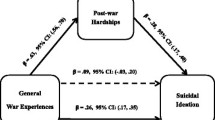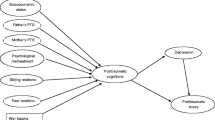Abstract
Previous research has identified strong associations between war experiences and posttraumatic stress disorder (PTSD). Few studies, however, have explored the underlying mechanisms of these associations in an integrated model. This study explored whether feelings of anger, shame, and guilt mediated the effects of war experiences and PTSD and if this association is heightened in former child soldiers from Northern Uganda. Nearly 40% of the sample were former child soldiers (N = 122), and 189 were civilians. A total of 35.5% met the proposed ICD-11 criteria for PTSD. Findings indicated previous war experiences were directly associated with PTSD. Anger and guilt were significant mediators of this effect, child soldier status did not moderate the mediated effects. This study provides an alternative framework of assessing the association between trauma and PTSD using a sample of young adults exposed to mass conflict.

Similar content being viewed by others
References
Ai, A. L., Peterson, C., & Ubelhor, D. (2002). War related trauma and symptoms of posttraumatic stress disorder among adult Kosovar refugees. Journal of Traumatic Stress, 15(2), 157–160.
American Psychiatric Association. (2013). Diagnostic and statistical manual of mental disorders (5th ed.). Washington, DC: American Psychiatric Association.
Amone-P’Olak, K., Jones, P. B., Abbott, R., Meiser-Stedman, R., Ovuga, E., & Croudace, T. J. (2013). Cohort profile: mental health following extreme trauma in a northern Ugandan cohort of War-Affected Youth Study (The WAYS Study). SpringerPlus, 2(1), 1–11.
Amone-P’Olak, K., Jones, P., Meiser-Stedman, R., Abbott, R., Ayella-Ataro, P. S., Amone, J., & Ovuga, E. (2014). War experiences, general functioning and barriers to care among former child soldiers in Northern Uganda: the WAYS study. Journal of Public Health, 36(4), 568–576.
Andrews, B., Brewin, C. R., Rose, S., & Kirk, M. (2000). Predicting PTSD symptoms in victims of violent crime: the role of shame, anger, and childhood abuse. Journal of Abnormal Psychology, 109(1), 69–73.
Bayer, C. P., Klasen, F., & Adam, H. (2007). Association of trauma and PTSD symptoms with openness to reconciliation and feelings of revenge among former Ugandan and Congolese child soldiers. JAMA, 298, 555–559.
Beck, J. G., McNiff, J., Clapp, J. D., Olsen, S. A., Avery, M. L., & Hagewood, J. H. (2011). Exploring negative emotion in women experiencing intimate partner violence: shame, guilt, and PTSD. Behaviour Therapy, 42(4), 740–750.
Betancourt, T. S., Borisova, I., Williams, T. P., Meyers‐Ohki, S. E., Rubin‐Smith, J. E., Annan, J., & Kohrt, B. A. (2013). Research review: psychosocial adjustment and mental health in former child soldiers – A systematic review of the literature and recommendations for future research. Journal of Child Psychology and Psychiatry, 54(1), 17–36.
Browne, T., Evangeli, M., & Greenberg, N. (2012). Trauma-related guilt and posttraumatic stress among journalists. Journal of Traumatic Stress, 25, 207–210.
Castillo, D. T., Baca, J. C. D., Conforti, K., Qualls, C., & Fallon, S. K. (2002). Anger in PTSD: general psychiatric and gender differences on the BDHI. Journal of Loss & Trauma, 7(2), 119–128.
Catani, C., Jacob, N., Schauer, E., Kohila, M., & Neuner, F. (2008). Family violence, war, and natural disasters: a study of the effect of extreme stress on children’s mental health in Sri Lanka. BMC Psychiatry, 8(1), 33. doi:10.1186/1471-244X-8-33.
Chemtob, C. M., Novaco, R. W., Hamada, R. S., Gross, D. M., & Smith, G. (1997). Anger regulation deficits in combat related posttraumatic stress disorder. Journal of Traumatic Stress, 10(1), 17–36.
Clark, D. A., & Beck, A. T. (2010). Cognitive therapy of anxiety disorders. London: The Guilford Press.
Cloitre, M., Roberts, N., Bisson, J., & Brewin, C. R. The ICD-11 Trauma Questionnaire. Self- Report Community Version 1.4. Unpublished manuscript.
Currier, J. M., Holland, J. M., & Malott, J. (2015). Moral injury, meaning making, and mental health in returning veterans. Journal of Clinical Psychology, 71(3), 229–240.
Ehlers, A., & Clark, D. M. (2000). A cognitive model of persistent posttraumatic stress disorder. Behaviour Research and Therapy, 38, 319–345.
Elbert, T., Weierstall, R., & Schauer, M. (2010). Fascination violence: on mind and brain of man hunters. European Archives of Psychiatry and Clinical Neuroscience, 260(2), 100–105.
Ertl, V., Pfeiffer, A., Schauer, E., Elbert, T., & Neuner, F. (2011). Community-implemented trauma therapy for former child soldiers in northern Uganda: a randomized controlled trial. JAMA, 306(5), 503–512.
Foa, E. B., Riggs, D. S., Massie, E. D., & Yarczower, M. (1995). The impact of fear activation and anger on the efficacy of exposure treatment for posttraumatic stress disorder. Behaviour Therapy, 26(3), 487–499.
Ginzburg, K., Butler, L. D., Giese-Davis, J., Cavanaugh, C. E., Neri, E., Koopman, C., … & Spiegel, D. (2009). Shame, guilt, and posttraumatic stress disorder in adult survivors of childhood sexual abuse at risk for human immunodeficiency virus: Outcomes of a randomized clinical trial of group psychotherapy treatment. The Journal of Nervous and Mental Disease, 197(7), 536–542.
Hansen, M., Hyland, P., Armour, C., Shevlin, M., & Elklit, A. (2015). Less is more? Assessing the validity of the ICD-11 model of PTSD across multiple trauma samples. European Journal of Psychotraumatology, 6. doi:10.3402/ejpt.v6.28766
Hayes, A.F. (2012). PROCESS: A versatile computational tool for observed variable mediation, moderation, and conditional process modeling. [White Paper]. Retrieved from http://www.afhayes.com/public/process2012.pdf.
Hermenau, K., Hecker, T., Maedl, A., Schauer, M., & Elbert, T. (2013). Growing up in armed groups: trauma and aggression among child soldiers in DR Congo. European Journal of Psychotraumatology, 4. doi:10.3402/ejpt.v4i0.21408
Jakupcak, M., Conybeare, D., Phelps, L., Hunt, S., Holmes, H. A., Felker, B., … & McFall, M. E. (2007). Anger, hostility, and aggression among Iraq and Afghanistan war veterans reporting PTSD and subthreshold PTSD. Journal of Traumatic Stress, 20(6), 945–954.
Johnson, H., & Thompson, A. (2008). The development and maintenance of post-traumatic stress disorder (PTSD) in civilian adult survivors of war trauma and torture: a review. Clinical Psychology Review, 28(1), 36–47.
Klasen, F., Oettingen, G., Daniels, J., Post, M., Hoyer, C., & Adam, H. (2010). Posttraumatic resilience in former Ugandan child soldiers. Child Development, 81(4), 1096–1113.
Klasen, F., Reissmann, S., Voss, C., & Okello, J. (2015). The guiltless guilty: trauma-related guilt and psychopathology in former Ugandan child soldiers. Child Psychiatry & Human Development, 46(2), 180–193.
Kolassa, I. T., Ertl, V., Eckart, C., Kolassa, S., Onyut, L. P., & Elbert, T. (2010). Spontaneous remission from PTSD depends on the number of traumatic event types experienced. Psychological Trauma: Theory, Research, Practice, and Policy, 2(3), 169–174.
Kubany, E. S., & Watson, S. B. (2003). Guilt: elaboration of a multidimensional model. The Psychological Record, 53, 51–90.
Kubany, E. S., Abueg, F. R., Brennan, J. M., Haynes, S. N., Manke, F. P., & Stahura, C. (1996). Development and validation of the trauma-related guilt inventory. Psychological Assessment, 8(4), 428–444.
Leskela, J., Dieperink, M., & Thuras, P. (2002). Shame and posttraumatic stress disorder. Journal of Traumatic Stress, 15(3), 223–226.
Litz, B. T., Stein, N., Delaney, E., Lebowitz, L., Nash, W. P., Silva, C., & Maguen, S. (2009). Moral injury and moral repair in war veterans: a preliminary model and intervention strategy. Clinical Psychology Review, 29(8), 695–706.
Maercker, A., Brewin, C.R., Bryant, R.A., Cloitre, M., Reed, G.M., van Ommeren, M., …& Saxena, S. (2013). Proposals for mental disorders specifically associated with stress in the International Classification of Diseases-11. The Lancet, 381(9878), 1683–1685.
Marx, B. P., Foley, K. M., Feinstein, B. A., Wolf, E. J., Kaloupek, D. G., & Keane, T. M. (2010). Combat related guilt mediates the relations between exposure to combat related abusive violence and psychiatric diagnoses. Depression and Anxiety, 27(3), 287–293.
Miller, K. E., & Rasmussen, A. (2010). War exposure, daily stressors, and mental health in conflict and post-conflict settings: bridging the divide between trauma-focused and psychosocial frameworks. Social Science & Medicine, 70(1), 7–16.
Mugisha, J., Muyinda, H., Wandiembe, P., & Kinyanda, E. (2015). Prevalence and factors associated with posttraumatic stress disorder seven years after the conflict in three districts in northern Uganda (The Wayo-Nero Study). BMC Psychiatry, 15(1), 170. doi:10.1186/s12888-015-0551-5.
Murphy, S., Murphy, J., & Shevlin, M. (2015). Negative evaluations of self and others, and peer victimization as mediators of the relationship between childhood adversity and psychotic experiences in adolescence: the moderating role of loneliness. British Journal of Clinical Psychology, 54(3), 326–344.
Nazarov, A., Jetly, R., McNeely, H., Kiang, M., Lanius, R., & McKinnon, M. C. (2015). Role of morality in the experience of guilt and shame within the armed forces. Acta Psychiatrica Scandinavica, 132(1), 4–19.
Neuner, F., Schauer, M., Karunakara, U., Klaschik, C., Robert, C., & Elbert, T. (2004). Psychological trauma and evidence for enhanced vulnerability for posttraumatic stress disorder through previous trauma among West Nile refugees. BMC Psychiatry, 4(34). doi:10.1186/1471-244X-4-34.
Novaco, R. W., & Chemtob, C. M. (2002). Anger and combat-related posttraumatic stress disorder. Journal of Traumatic Stress, 15(2), 123–132.
O’Donnell, M.L., Alkemade, N., Nickerson, A., Creamer, M., McFarlane, A.C., Silove, D., … Forbes, D. (2014). Impact of the diagnostic changes to post-traumatic stress disorder for DSM-5 and the proposed changes to ICD-11. The British Journal of Psychiatry, 205(3), 230–235.
Orth, U., & Wieland, E. (2006). Anger, hostility, and posttraumatic stress disorder in trauma-exposed adults: a meta-analysis. Journal of Consulting and Clinical Psychology, 74(4), 698–706.
Owens, G. P., Chard, K. M., & Cox, T. A. (2008). The relationship between maladaptive cognitions, anger expression, and posttraumatic stress disorder among veterans in residential treatment. Journal of Aggression, Maltreatment & Trauma, 17(4), 439–452.
Pham, P., Vinck, P., & Stover, E. (2009). Returning home: forced conscription, reintegration, and mental health status of former abductees of the Lord’s resistance army in northern Uganda. BMC Psychiatry, 9, 23. doi:10.1186/1471-244X-9-23.
Pugh, L. R., Taylor, P. J., & Berry, K. (2015). The role of guilt in the development of post-traumatic stress disorder: a systematic review. Journal of Affective Disorders, 182, 138–150.
Roberts, B., Ocaka, K. F., Browne, J., Oyok, T., & Sondorp, E. (2008). Factors associated with post-traumatic stress disorder and depression amongst internally displaced persons in Northern Uganda. BMC Psychiatry, 8(1), 38. doi:10.1186/1471-244X-8-38.
Schaal, S., & Elbert, T. (2006). Ten years after the genocide: trauma confrontation and posttraumatic stress in Rwanda adolescents. Journal of Traumatic Stress, 19, 95–105.
Silove, D. (1999). The psychosocial effects of torture, mass human rights violations, and refugee trauma: toward an integrated conceptual framework. The Journal of Nervous and Mental Disease, 187(4), 200–207.
Stotz, S.J., Elbert, T., Müller, V., & Schauer, M. (2015). The relationship between trauma, shame, and guilt: findings from a community-based study of refugee minors in Germany. European Journal of Psychotraumatology, 6. doi:10.3402/ejpt.v6.25863
UNICEF. (2010). B&H post-war screening survey. New York: UNICEF.
Vinck, P., Pham, P. N., Stover, E., & Weinstein, H. M. (2007). Exposure to war crimes and implications for peace building in northern Uganda. JAMA, 298(5), 543–554.
Weierstall, R., Schaal, S., Schalinski, I., Dusingizemungu, J.P., & Elbert, T. (2011). The thrill of being violent as an antidote to posttraumatic stress disorder in Rwandese genocide perpetrators. European Journal of Psychotraumatology, 2. doi:10.3402/ejpt.v3i0.63
Weierstall, R., Bueno Castellanos, C. P., Neuner, F., & Elbert, T. (2013). Relations among appetitive aggression, post-traumatic stress and motives for demobilization: A study in former Colombian combatants. Conflict and Health, 7(9). doi:10.1186/1752-1505-7-9.
Author information
Authors and Affiliations
Corresponding author
Ethics declarations
Funding/Disclosure of Interest
Authors acknowledge no outside funding or personal relationships.
Ethical approval
All procedures performed in studies involving human participants were in accordance with the ethical standards of the institutional and/or national research committee and with the 1964 Helsinki declaration and its later amendments or comparable ethical standards.
Informed consent
Informed consent was obtained from all individual participants included in the study.
Rights and permissions
About this article
Cite this article
Murphy, S., Elklit, A., Dokkedahl, S. et al. Anger, Guilt and Shame as Mediators in the Relationship Between war Experiences and PTSD: Testing the Moderating Role of Child Soldier Status. Journ Child Adol Trauma 10, 323–331 (2017). https://doi.org/10.1007/s40653-016-0124-x
Published:
Issue Date:
DOI: https://doi.org/10.1007/s40653-016-0124-x




